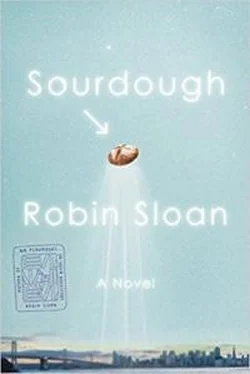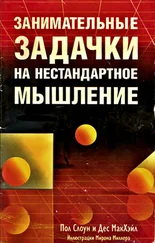Did that mean I’d finally see him?
Lily Belasco’s eyes were merry when I asked. “In a manner of speaking.”
“How often do you see him?”
She dug in the pockets of her slouchy jacket. “He’s pretty hands-off, but I keep him in the loop.” She produced a wide phone and waggled it. “Encrypted messages. He keeps the bank account full. What more can you ask for?”
Wandering the workstations, I heard rumors. Mr. Marrow was moving the market to Los Angeles. To Tokyo. He was shutting it down. He had run out of money. He was being pursued by the SEC. The yakuza. The Department of Health. (This last possibility seemed, to me, the most plausible.)
In the early morning, an hour before the preview was set to begin, all of us gathered in the lemon grove. Some loitered among the trees, others sat at the long picnic table. I found a seat with Orli, Naz, and Jaina Mitra. Jaina slumped, head propped up by one hand, her cheek smooshed, eyes half-lidded. She looked utterly spent.
Belasco had wheeled an enormous TV out to face the long picnic table and was now fiddling with the laptop at Naz’s coffee bar, patching her phone into the sound system. The TV glared bright, basic blue, the words NO SIGNAL migrating slowly across it.
Mr. Marrow wasn’t going to be here at all.
“He lives in China,” Orli whispered. “It’s already nighttime there.”
Naz looked dubious. “No, he’s here with us.” He lowered his voice to a hiss. “Do you see Horace anywhere? He’s Horace.”
“Okay, folks,” Belasco called out. The depot’s soundtrack went quiet and was replaced with the buzz of a phone line. At the same time, the TV showed a painted still life: a feast set up on a pockmarked table with a deep blue curtain hanging inexplicably behind it. On the table were a heel of bread and a bowl of plums. A curved knife protruded from a rump of cheese. On a bright platter there was a whole fish, its mouth frozen in an eternal yawp. Everything in the scene gleamed as if lacquered.
A voice boomed out over the speakers.
“I haven’t met all of you,” the voice said, “but I’ve tasted everything you have to offer.” Its tone was deep, digitally disguised. The long space smeared it with echoes. It was as if the concourse itself were speaking to us. This was the voice of Mr. Marrow.
As for his face: with every syllable, the fish in the painting moved its tiny mouth.
“I’ve gathered you here for a long-awaited announcement.”
The juxtaposition—the booming voice, the tiny fish—was weird and hilarious. I looked around. No one was smiling.
“We’ve been here for a little over a year. Lily Belasco opened the doors and wheeled in the lemon trees. Some of you joined shortly after. Others have only been here a few weeks. We’ve been running previews all summer, and I know most of you are wondering: When do we open to the public?”
Murmurs of assent. I’d been more than busy enough serving the customers who showed up for the previews, but others were apparently ready to reach a larger market.
“There is a great realignment coming,” the fish intoned. “It will be equal to the upheaval of the 1950s. You have heard me say this before. In those years, the entire experience of eating in America was remade. Packaging, refrigeration, the interstate highways—you can trace it all back. These systems were invented by particular people, at particular times, in particular places.” The fish paused. “Times like now.” Its glittering eyes scanned back and forth. “Places like this.” Another pause. “We can build a new system.”
The shiver of pleasure that ran through the assembled vendors was so intense I felt it like a rattling gust. They believed the fish. The fish was their prophet.
“On both sides, they’ve failed us,” the fish said. “Of course, we know about the industrialists. Their corn syrup and cheese product. Their factory farms ringed by rivers of blood and shit, blazing bonfires of disease barely contained by antibiotic blankets. These are among the most disgusting scenes in the history of this planet.”
Murmurs of agreement and apprehension at that.
“But on the other side … the organic farms, the precious restaurants … these are toy supply chains. ‘Farm to table,’ they say. Well. When you go from farm to table, you leave a lot of people out.” The crowd was silent. “I think more poorly of these people than I do of the industrialists, because they know better . They know it’s all broken, and what do they do? They plant vegetables in the backyard.”
The fish would get along with Andrei.
“So that leaves us .”
Wait, was the fish…?
“The doors of the Marrow Fair open to the public not this Wednesday but the next.”
The vendors exploded with agitation and excitement.
“That’s too soon!” someone cried.
“Is there a plan for parking?” asked someone else. “I think we need a plan for parking.”
The fish closed its mouth, lidded its eyes, and the painting was still. The TV went blue again, and after a moment, Naz’s soundtrack resumed.
There were whoops and groans, smiles and nods, high fives that snagged the branches of the lemon trees.
Across the picnic table, Jaina Mitra looked stricken.
To no one in particular, she said, “I’m not ready yet.”
QUITTING
THE MARROW FAIR was happening for real, and soon my two jobs would not coexist so comfortably. Lily Belasco expected the market’s foot traffic to equal the Ferry Building’s, eventually. That meant thousands of people a day. It was time to choose.
I visited General Dexterity’s website. The Vitruvian 3 was calmly listed for sale at forty thousand dollars, or forty-eight with a two-year support package.
My salary was hefty, but my Cabrillo Street rent was commensurate. However, I spent basically nothing on food, transportation, health care, or entertainment, so after a year in San Francisco, my savings account had swollen to a little over ten thousand dollars.
Employment at General Dexterity carried with it a small allotment of stock options, and of those, a quarter had vested and were officially mine. The company was still privately held, almost entirely by Andrei, so I couldn’t sell them directly, but there was a standing offer to impatient Dextrous from a Qatari prince who would buy our options at a slight discount. (When I first heard about this, it seemed breathtakingly exotic, possibly illegal, but the cold-eyed wraiths all shrugged. Apparently every tech company had a prince waiting in the wings.) I cashed out my options, which brought my total to thirty-seven thousand dollars.
I almost had enough to buy the Vitruvian outright, but mindful of the need to also eat and pay rent, I decided to seek additional financing.
I explained it first to Lily Belasco. “Just like he bought Jaina’s sequencer,” I said. “And her subscription to the microbe thing.”
“How much are we talking about?”
I told her, and Belasco nodded slowly. “I’ll check.”
Later, she appeared at my workstation. She watched the Vitruvian work for a moment. “Forty thousand dollars, really?”
“The cost is mainly in the pressure sensors,” I said. “They have twenty-four-bit resolution, and the sample rate … Anyway, they’re expensive.”
Belasco initiated a call, switched her phone to speaker mode, and placed it on the ping-pong table. In another moment, the modulated voice of Mr. Marrow squawked through the little speakers. He wasted no time with a preamble.
“The problem, as I see it, is that you’ve done the crucial work—here in my market, I should add—as an employee of another company. Your employer owns that work, correct? So what does my investment get me?”
Читать дальше










